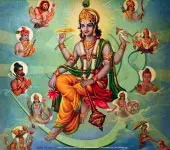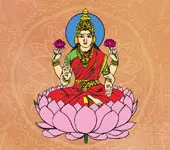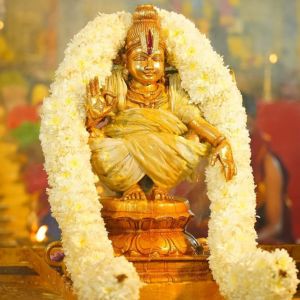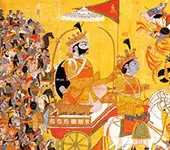Why Kurukshetra War Happened
The Kurukshetra War is one of the most significant events in Indian mythology. Discover the reasons behind this epic battle
Transcript
(Click here to read more)
The sixty-first chapter of the Amshavatarana Parva which is part of Adi Parva of Mahabharata gives a condensed description of everything that led to the battle of Kurukshetra. Vaisampayana is telling Janamejaya and all the others at the venue of Sarpa yajna the reason for the dispute between the Pandavas and Kauravas. After their father Pandu passed away, the Pandavas returned to the palace from the forest and started living there. They learned the Vedas and also Dhanurveda. Became experts in both. Because of their knowledge, courage, and virtuous behavior, t....
Transcript
(Click here)
The sixty-first chapter of the Amshavatarana Parva which is part of Adi Parva of Mahabharata gives a condensed description of everything that led to the battle of Kurukshetra.
Vaisampayana is telling Janamejaya and all the others at the venue of Sarpa yajna the reason for the dispute between the Pandavas and Kauravas.
After their father Pandu passed away, the Pandavas returned to the palace from the forest and started living there.
They learned the Vedas and also Dhanurveda.
Became experts in both.
Because of their knowledge, courage, and virtuous behavior, the Pandavas soon became very popular among the public.
They progressed in terms of wealth also.
Kauravas became jealous.
Duryodhana, Karna, and Shakuni together conspired; either the Pandavas should be made subservient, kept under control, or they should be sent away forever.
They created many plots to get this done.
They gave poison to Bhima.
Duryodhana tied up Bhima and drowned him in Ganga when he was asleep.
In spite of all these, the Pandavas did not develop any animosity towards them.
They never tried to take revenge.
Vidura was supporting Pandavas.
Vidura is their uncle.
He used to caution them about the plots of the Kauravas.
A palace made of shellac was constructed at Varanavata for the Pandavas and they were told to live there by Dhritarashtra.
Shellac is highly inflammable.
Purochana was the caretaker of the shellac palace.
He was supposed to make Pandavas and their mother comfortable there and later set it on fire and kill them.
Vidura revealed this to the Pandavas.
They stayed there for a year, in the meantime dug a tunnel to come out.
Then they set the shellac palace on fire, killed Purochana, and escaped. Everyone thought they died in the fire.
In the forest, Bhima killed a Rakshasa called Hidimba and married Hidimbaa. Ghatotkacha was born to them.
Then they went to a place called Ekachakra and lived there in disguise as brahmacharis engaged in Vedic chanting.
Near Ekachakra, there was a man-eater Rakshasa called Baka.
Bhima killed him and saved the residents of Ekachakra.
Then the swayamvara of Panchali happened.
The Pandavas got Panchali as their wife, but in the process, their identities were revealed.
They stayed in Panchala for one year.
Then they came back to Hastinapur.
Dhritarashtra and Bheeshma told them, we have found a way to avoid any conflict between you cousins.
You people go and live in Khandavaprastha.
It is a beautiful place.
You can flourish there.
It was actually a division of the kingdom.
Pandavas started doing very well at Khandavaprastha.
They expanded their kingdom.
Then due to some reason Yudhishtira sent Arjuna away for 12 years and one month.
Arjuna did pilgrimage during that time, married nagakanya Uloopi, married Chitrangada, married Subhadra.
Then Arjuna returned to Khandavaprastha along with Lord Krishna and did upasana of Agni.
Agni gave him the bow called Gandeeva, two quivers that would never become empty, and a chariot.
Arjuna had saved the asura shilpi Maya once.
Maya built a beautiful palace for the Pandavas at Khandavaprastha.
Seeing the progress of Pandavas, Kauravas became jealous and greedy.
They trapped Yudhishtira into the game of gambling.
Shakuni cheated them in the game, took away everything, and sent the Pandavas away for vanavasa for 12 years and one more year of ajnata vasa.
On completion of this, Pandavas returned and asked their kingdom and wealth back.
Kauravas refused.
Then the battle of Kurukshetra happened.
Pandavas destroyed Kauravas and reclaimed their kingdom.
This is the essence of what happened between the Pandavas and Kauravas.
Recommended for you
Sri Hari is ready to face any trouble for you
 Click here to know more..
Click here to know more..
Sri Suktam Explained-Part 7
 Click here to know more..
Click here to know more..
Shasta Bhujanga Stotram

shritaanandachintaa- manishreenivaasam sadaa sachchidaananda- poornaprakaasham. udaaram sadaaram suraadhaarameesham param jyotiroopam bhaje bhootanaat....
Click here to know more..
English Topics
Mahabharatam
Click on any topic to open
- 95 What is behind Calling the Five Brothers the Pandavas
- 94 Give up an Individual IF....
- 93 Fascinating Birth Story of the Kauravas
- 92 Overcoming Grief - Lessons from King Senajit's story
- 91 Yayati's Wisdom
- 90 Yayati's Story
- 89 Brahmacharis Can Bless And Curse
- 88 Human Nature - Comples Mix Of Good And Bad
- 87 Results Of Good Karma
- 86 What Gives Results - Luck or Effort?
Please wait while the audio list loads..
30
Ganapathy
Shiva
Hanuman
Devi
Vishnu Sahasranama
Mahabharatam
Practical Wisdom
Yoga Vasishta
Vedas
Rituals
Rare Topics
Devi Mahatmyam
Glory of Venkatesha
Shani Mahatmya
Story of Sri Yantra
Rudram Explained
Atharva Sheersha
Sri Suktam
Kathopanishad
Ramayana
Mystique
Mantra Shastra
Bharat Matha
Bhagavatam
Astrology
Temples
Spiritual books
Purana Stories
Festivals
Sages and Saints
